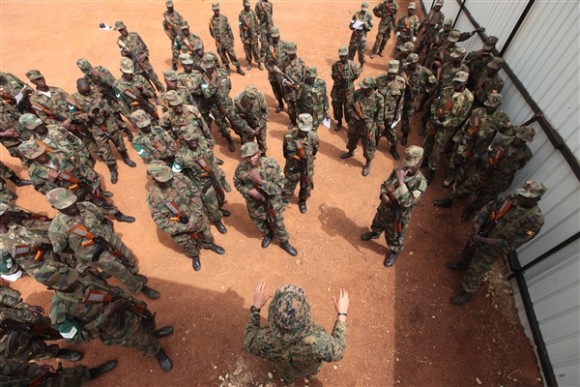
The U.S. has deployed “200 Marines to a naval base in Sicily for possible operations in Libya,” according to UPI, the latest in the establishment of “a network of bases in Italy as launch pads for military interventions in Africa and the Mideast.”
The UPI report adds: “U.S. operations in Africa are growing as the Islamist threat expands.” Not quite. U.S. operations are indeed growing in Africa, but it isn’t being driven by an “Islamist threat” to America.
This has been a long time coming. The Obama administration has been slowly – and very quietly – getting America militarily involved throughout Africa. While extreme poverty and governance problems still plague Africa, many countries have been improving infrastructure and developing their economies like never before. And this has grabbed the attention of more advanced economies, especially given several areas of untapped oil and gas.
“China-Africa trade grew 1000% from $10 billion in 2000 to $107 billion in 2008,” according to Zbigniew Brzezinski’s recent book Strategic Vision. Uncle Sam would be damned if he let that competition slide without a response. Since 2007, when AFRICOM was established, the U.S. has been trying to up its game, except that usually means militarily. Washington has been increasing its support for African regimes, many with records of human rights violations, and boosting efforts to train African militaries to keep them dependent on the Pentagon. The U.S. is training and equipping militaries in countries including Algeria, Burkina Faso, Chad, Mali, Mauritania, Morocco, Niger, Nigeria, Senegal and Tunisia – not to mention operations in Libya, Somalia, Uganda, Kenya, Djibouti, et al. – all in the name of preventing “terrorists from establishing sanctuaries.”
But America is getting itself tangled in its own web of expansion and blowback, using every bad consequence of previous interventions to justify new ones.
The U.S.-backed Ethiopian invasion of Somalia in 2006 gave rise to the militant group al-Shabab, a group that is now formally allied with al-Qaeda and ironically justifying further interventions. Beyond that, Al-Qaeda’s presence in Africa was generated in large part by the U.S.-NATO war in Libya two years ago. Jihadist fighters from abroad joined the rebel militias in Libya early on and then exploited the power vacuum left when the U.S. helped them overthrow the Gadhafi regime. As the Washington Post reported, “the overthrow of dictator Moammar Gaddafi in Libya triggered a migration of African mercenaries and their weapons back to countries where al-Qaeda elements are based.” Ansar al-Sharia now has a presence in Libya and Islamic extremists are present in Mali, which was destabilized thanks to the chaos in Libya.
Even still, the notion that these groups have the ability or the intention to attack the U.S., or present any significant threat to speak of, is hard to believe. Al-Shabab militants “do not pose a threat to the U.S. homeland or to U.S. interests in East Africa,” according to Bronwyn Bruton, deputy director of the Atlantic Council’s Africa Center.
“[T]he actual risk of a terrorist attack by Al Shabab on a soft target in the U.S. remains very low, and should not be a cause for alarm,” adds Ken Menkhaus, a professor of political science. Nevertheless, the U.S. continues to send JSOC teams into Somalia, hover drones above militant territory, and fund unscrupulous proxies on the ground.
In Nigeria, the radical group Boko Haram has not had its sights on the U.S., but that is likely to change in due time thanks to increased U.S. support for the Nigerian military and other U.S. meddling. Boko Haram “remains largely focused on a Nigerian domestic agenda,” according to EJ Hogendoorn, Africa deputy program director at International Crisis Group.
Unfortunately, that’s not enough for Washington. In the words of Rep. Patrick Meehan (R-PA), “While I recognize there is little evidence at this moment to suggest Boko Haram is planning attacks against the [U.S.] homeland, lack of evidence does not mean it cannot happen.”
What a great strategy! Assume everything poses a threat and intervene everywhere!
The issue of Islamic militancy in Africa is, at its core, an inflated threat that is providing the U.S. justification to invade and dominate Africa like it has the Middle East, Latin America, Europe, and East Asia. The real worry is how it is being done: in near total secrecy. Americans aren’t voting for increased U.S. militarism in Africa. They, and probably their representatives, are mostly unaware. But the Obama administration’s penchant for secrecy and covert war is making it all happen without any debate.
Down the line, we will be talking about how these early Obama-era interventions planted the seeds of our future threats, instability, and quagmires in Africa.


